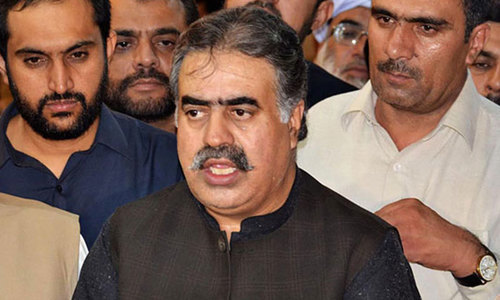For the first time in Balochistan’s political history, cracks have surfaced in powerful families in the province, reducing their influence on the electoral scene as entire tribes find themselves torn between opposing brothers and cousins.
Read: Balochistan's electoral politics take sibling rivalries to the next level
In the past, when a member of the ruling elite from a tribe would announce their candidacy, no one from the area would even consider running against them. Now, it’s a different story. But the challengers are not simply other tribesmen, rather brothers, cousins, nephews and uncles. Consider the case of the Marri tribe, whose members must decide which brother to vote for in the PB-9 constituency of Kohlu district.
Following the death of Nawab Khair Bakhsh Marri in June 2014, his eldest son Changez Khan Marri replaced him as the chief of the tribe. The new chief’s younger brother Gazain Khan Marri does not seem to agree with him on all counts, as he has decided to run against him as an independent candidate. But some commentators in the area see the dispute among the Marri brothers as a ray of hope — one that has allegedly weakened ancient tribal power nexuses.

According to one such analyst, Dr Shah Mohammad Marri, these new developments in the political landscape will help mend the relationships of the warring tribes. “In the past, leaders of the Bugti, Marri and Mengal tribes would never consider visiting each other’s hometowns. But now things are different… for example notable members of the Bugti tribe visited Kohlu district to talk about the elections.”
There are some analysts, however, who disagree with the claim that there have never been such familial disputes in the past. Asif Baloch, who edits a Quetta-based paper, agrees with that assessment. “It is an old phenomenon. Members of the ruling elite of Baloch tribes are engrossed in a tribal conflict for power and supremacy. The tug-of-war is inevitable, and that is why we see families divided — in this instance, contesting elections against each other.”

The invisible hand?
Some have argued that there is a deeper layer to what is happening — that there are elements pulling strings to cause strife amongst the Baloch by pitting their leaders against each other.
Nawab Aslam Raisani, a former chief minister of the province, had himself grudgingly acknowledged that his younger brother Siraj Raisani was running against him for the provincial seat of the PB-35 Mastung constituency. Siraj Raisani was tragically killed in a horrific terrorist attack on Friday (July 13).
Professor Hamid Baloch of the University of Balochistan traces back political engineering and induced power struggles to the British Raj. Speaking to Dawn the professor argued, “Actually… all of this is the continuation of the British policy of divide and conquer. The colonisers created power hierarchies and discord among the people. There was the Sardar of the public, and then, there was the Sardar of the ‘sarkar’ or the Raj. The situation today in Balochistan’s electoral politics, the manoeuvrings and the rest that come with it, are all just extensions of colonial policies.”
In the past, leaders of the Bugti, Marri and Mengal tribes would never consider visiting each other’s hometowns. But now things are different. Analyst Dr Shah Mohammad Marri
Among the Baloch, the dissonance is not just limited to the Marri tribe and the Raisani brothers. The Zehri tribe has its own problems, with the brothers Sanaullah Zehri and Israrullah Zehri going up against each other in the PB-38 Khuzdar constituency. While in the PB-36 constituency of Shaheed Sikandarabad, the other two Zehri brothers, Naimatullah Zehri and Zafarullah Zehri are set to lock horns.
Then there are cousins at it as well. In the Dera Bugti constituency of PB-10, Nawabzada Gohram Bugti is running against Nawabzada Aali Bugti. Both are grandsons of the late Nawab Akbar Khan Bugti. While in PB-27, Sibi/Lehri, Ali Mardan Domki and Sardar Sarfaraz Domki are up against each other.
Some political commentators contend that similar cracks may appear elsewhere in other families as well, for instance the Jamalis and the Magsis. While there is no visible dispute in the latter, the former does have a pair moving against one another. In the Nasirabad division, the National Assembly constituency of NA-261 is poised to be the battleground for Khan Mohammad Jamali and Changez Jamali. In PB-13, Jaffarabad, Umar Khan Jamali is running against Rahat Khan Jamali.
“If not brothers or close cousins, relatives have stood up against each other in the polls,” said a political analyst.

The changing Baloch society
Sanaullah Mengal, a doctorate candidate at the University of Balochistan, while speaking with Dawn posited that the social fabric of the Baloch is reweaving — or being reweaved. “Social norms have either evolved or have been forced to alter. There are now many more stakeholders than there were in the past, as forces from the top move the pieces. Traditions that are centuries old are no longer significant.”
Politicians and leaders in the province are usually self-appointed, but most of them are failing to live up to both demands and expectations of the people they claim to represent. “There is no growth in the democratic relationship between the electorate and its representatives. The entire scenario seems like it is being controlled. Given these circumstances, the Baloch seem to be stuck in a rut,” concludes Sanaullah Mengal.
Published in Dawn, July 19th, 2018















































Dear visitor, the comments section is undergoing an overhaul and will return soon.